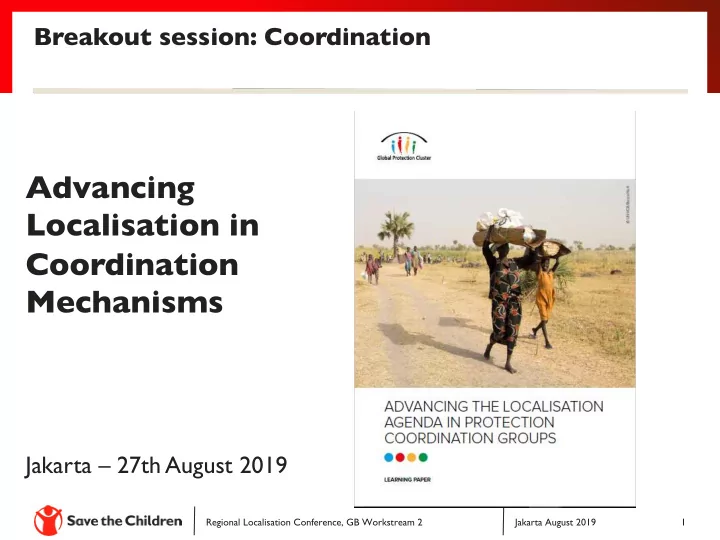

Breakout session: Coordination Advancing Localisation in Coordination Mechanisms Jakarta – 27th August 2019 Regional Localisation Conference, GB Workstream 2 Jakarta August 2019 1
Aim of the session • Share learning on advancing the localisation agenda in coordination mechanisms, • Provide input to a Guidance paper on inclusion of national and local actors in coordination mechanisms Regional Localisation Conference, GB Workstream 2 Jakarta August 2019 2
Agenda 1. Presentation of main findings from reports on coordination and inclusion 2. Group work 3. Feedback in plenary Regional Localisation Conference, GB Workstream 2 Jakarta August 2019 3
Grand Bargain Localisation Workstream Regional Localisation Conference, GB Workstream 2 Jakarta August 2019 4
Statistics on local responders in coordination mechanisms • 254 clusters surveyed in 23 operations, half have national or local authorities in leadership roles at national or subnational levels, • 42% of cluster members globally are national NGOs Regional Localisation Conference, GB Workstream 2 Jakarta August 2019 5
ALNAP: Improving Humanitarian Coordination July 2016 Regional Localisation Conference, GB Workstream 2 Jakarta August 2019 6
State and national civil society in coordination Advantages National state actors National Civil Society • State obligation • More effective coordination, as more initiatives are coordinated, • Statemechanisms can often respond quickly to emergencies • Reduce risk of undermining local • Often conversant with long-term ownership of the response development activities • Reduce risk of parallel systems - • Reduce risk of duplication often national networks and pre- existing coordination mechanisms • Reduce the risk of decreased state already exists legitimacy and accountability Regional Localisation Conference, GB Workstream 2 Jakarta August 2019 7
ALNAP 2016 – Selected Recommendations • Adaptability: Develop context-relevant coordination systems that build on existing government and civil society coordination mechanisms, one size does not fit all • Practicalities and culture: language, location, connectivity (IT), • Awareness: Explain to civil society the potential of coordination, Regional Localisation Conference, GB Workstream 2 Jakarta August 2019 8
Advancing the Localisation Agenda in Protection Coordination Groups Regional Localisation Conference, GB Workstream 2 Jakarta August 2019 9
Local actors in protection coordination groups • The membership of protection coordination groups is composed of a large number of national actors (government counterparts, national and local NGOs) and they participate regularly in cluster meetings. • Local actors recognized the benefits that the cluster system can bring to their organizations: • Being informed about practices and standards (22%) • Enhancing partnerships between humanitarian actors (19%) • Joining a forum for joint-advocacy (17%) • Coordinating and planning a more effective humanitarian response (15%) • Networking and peer support (14%) • Sharing information and good practices (12%) Regional Localisation Conference, GB Workstream 2 Jakarta August 2019 10
Obstacles to participation in cluster coordination Regional Localisation Conference, GB Workstream 2 Jakarta August 2019 11
Recommendations from the Protection coordination report Coordination groups: ü Strengthen capacity of national actors towards meaningful engagement with coordination groups, fostering a better understanding of the benefits and the processes of coordination. ü Take practical steps to address the barriers to meaningful participation, making coordination meetings more accessible and more culturally inclusive . ü Support national actors to be more engaged in governance structures and decision- making processes (e.g. cluster co-lead, SAG, steering committees, HCT) by providing guidance, orientation, training, funding opportunities. ü Give space for local actors to be part of decision-making processes including them in planning of humanitarian strategies; ü Engage diaspora in the humanitarian system and build on their capacities in terms of project design, data analyses and institutional capacity strengthening . Regional Localisation Conference, GB Workstream 2 Jakarta August 2019 12
Recommendations from the Protection Coordination report UN and INGOs: ü Invest in sustained capacity and institutional strengthening for local and national organizations to strengthen their coordination capacities ü Including a section in partnership agreements to identify priority recommendations that the national partner wants to work on over the course of the partnership. ü Ensure evaluation of any localization approach or research conducted in the sector. Share and replicate best practices and methodologies on localization that have worked and ensure those practices are taken to scale through coordination groups and are anchored in the cluster system. Regional Localisation Conference, GB Workstream 2 Jakarta August 2019 13
Recommendations from the Protection Coordination report National and local responders: ü Complete stakeholder/actor mapping (the 5W) to increase visibility and strategic positioning and meaningful participation within the cluster, seek to become Humanitarian Response Plan partners and advocate for increased access to funding mechanisms. Regional Localisation Conference, GB Workstream 2 Jakarta August 2019 14
Recommendations from the Protection Report Donors: ü Prioritize funding for interventions that demonstrate effective support to local partners’ coordination capacities. ü Commit to multi-year flexible funding to support core organizational costs of local organizations, to strengthen their leadership in protection coordination mechanisms. ü Support the idea that country-based pooled funds should be used to channel funds directly to local and national NGOs . Regional Localisation Conference, GB Workstream 2 Jakarta August 2019 15
Group discussion (45 min) Discuss and list approximately 3 main points pr question (b,c,d) Group work a) What coordination mechanisms have you used/been exposed to in your context? b) In your experience what has enabled/driven inclusion of local actors in coordination mechanisms? c) In your experience what has hindered or challenged inclusion of local actors in coordination mechanisms? d) What advice would you give to a coordinator on localisation in coordination? Regional Localisation Conference, GB Workstream 2 Jakarta August 2019 16
Plenary presentation (15 min) Group 1: Presentation Group 2: Presentation Similarities and summary Regional Localisation Conference, GB Workstream 2 Jakarta August 2019 17
For more information ü Read the GPC Learning Paper http://www.globalprotectioncluster.org/wp-content/uploads/Learning_Paper- on-localisatoin-screen.pdf ü Visit the GPC Localisation webpage http://www.globalprotectioncluster.org/themes/localisation/ Contact Alice Hawkes, IRC at alice.hawkes@rescue.org ü Titi Moektijasih, OCHA at moektijasih@un.org ü Katja Rosenstock, Save the Children, kr@redbarnet.dk ü Regional Localisation Conference, GB Workstream 2 Jakarta August 2019 18
Recommend
More recommend